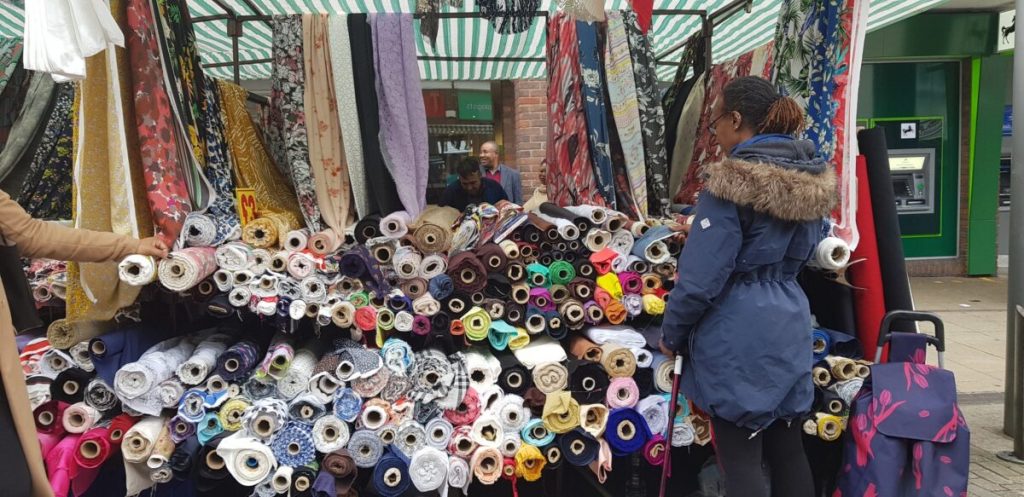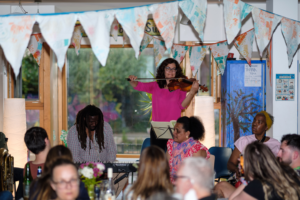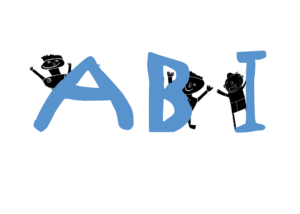Back in 2013 life moved very quickly for Rosy: as a police officer doing shift work and a fitness enthusiast she was on her feet for most of the day and enjoyed working in the community. However, on 22nd December of that year, Rosy was admitted to hospital following days of sickness and what followed was a frantic search for answers which eventually saw her being diagnosed with bacterial meningitis.
Can you tell us a little bit about when you were first admitted to hospital Rosy?
When I first got there I was just fighting to stay alive; when they did the tests and mentioned meningitis I thought it was viral, so I’d be fine. When I found out it was bacterial I asked the nurse “Oh my gosh am I going to die?”. I got pneumonia as well and because the meningitis was so bad, I had a complex stroke which hit three parts of my brain. So it completely changed me.
Fortunately I wasn’t unconscious or in a coma; but I still didn’t realise how ill I was. It was really weird. I was in so much pain… It felt like every part of my body was broken, but the fatigue was so great I couldn’t cry out in pain if that makes sense? It was just weird, and frightening. At night I’d think “will I wake up in the morning?”
I don’t think I was scared, just in shock. I was in hospital just over 3 weeks. When I got out of bed I was holding on to the side and the walls, but I just thought I was weak as I’d been ill.
What happened after you left hospital?
After hospital I went to my first lot of rehab, and was there for a month. When I came back from rehab they parked up with a wheelchair but I said no. I said “I left my house walking out, and I’m going to come back walking”. I just had that mentality. I live on my own, so I had carers to help me in the shower and to dress, and I had some grab rails put up. Then in September I went to rehab in Queen’s Square for another 2 months before returning home with more carers. When it got to the first year anniversary in December 2014, I said I didn’t want them anymore. Even though I still needed them, I was adamant, I didn’t want to be in that position a year later.
For me, proper rehab started when I was back in my own environment. In rehab it’s great, because you can concentrate on just getting better, but back here you have to do it all yourself. Nothing is geared up for a disability; I live in an old Victorian house with narrow, steep stairs
Ruby: “And also going out into the community as well. Like you said the rehab facility is a very controlled environment, when you can’t control people walking around in the street or kids running about. Learning how to cope with those too, that’s a big thing”
Yeah, and if you have a visible disability or it’s physical – I’m not saying it’s any easier, all disability is hard – but with a brain injury it’s been so annoying when people say “oh you’re back to normal”. It’s so frustrating! Yes I’m walking, but I now use a stick because of my balance issues, and they don’t understand the impact. I’m disabled now; there’s stuff I did so easily which I can’t do now, or things take me longer. I used to drive, I had to sell my car and they took my licence back. It really upset me, to the point of crying, because it meant losing another part of my independence. I used to look outside and see people running, and I would bawl my eyes out because I couldn’t do it anymore and that used to be my escape mode. Same with filling in forms, if it’s short and simple it’s fine but as soon as it gets any more, I can’t cope with it. Even at the rehab, the person at the rehab would say “don’t think about it, you just do it naturally” but surely, they must understand is it doesn’t come naturally now!
Ruby: “Yeah you’re re-learning. The whole point of learning is it doesn’t come naturally. That’s why you’re learning it!”
If there’s noise going on, and say walking and talking, it’s hard work for me. And it’s the fatigue, people will say “how could you feel tired, you’ve only been up for an hour?” but it’s tiring. It’s things like that that frustrate me; as I was so independent. I just have to learn “that was then” and I think I’m OK doing that, it’s just every now and then.
When did you first start with Headway East London’s Community Support Work?
It was in Homerton, in 2015, where they mentioned a support worker. The OT there insisted that it had to be one who specialised in people with brain injury, so we fought for that. I started with a Headway Support worker in January 2016, with 4 hours a week and then a few months later we reviewed and moved it up to 6 and then in the last few months we moved it up to 8. When you’re on your own 6 hours isn’t a lot to get everything done, so this is really good and without them I don’t know what would have happened.
Having someone who specialises in brain injury makes such a difference, I can’t even describe. Like I’ll be talking to Ruby and if I blank out or ask her to do something it’s not because I’m lazy; she’ll know that my brain injury means it takes a lot to do the simple things. I know if I was with someone with general knowledge it wouldn’t be like that; it’s even happened before with my carers after hospital.
Ruby: “Then you end up having to explain yourself too.”
And I get fed up of having to explain. Because of my brain injury, my brain finds it difficult to process moving things. So when I walk, I will have to stop regularly, so that I don’t get too dizzy. I might try and push myself and Ruby will say “no you have to slow down”. Or when we’re out and there’s too much noise, having a specialised person there for when I need to sit down or get out of there quickly, they understand where I’m coming from. Without them I’d be stuck. It’s just about getting out and about…
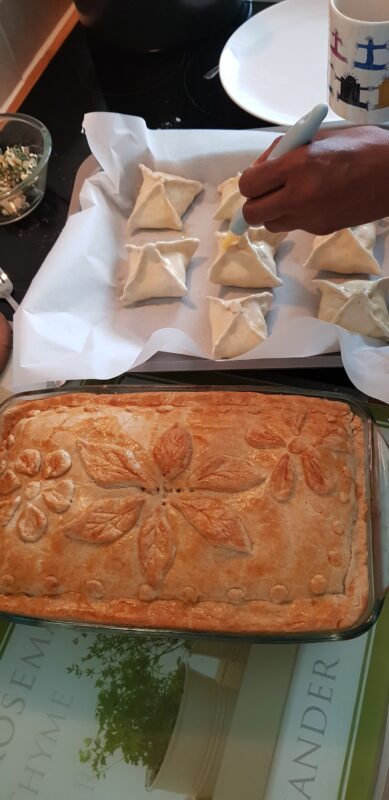
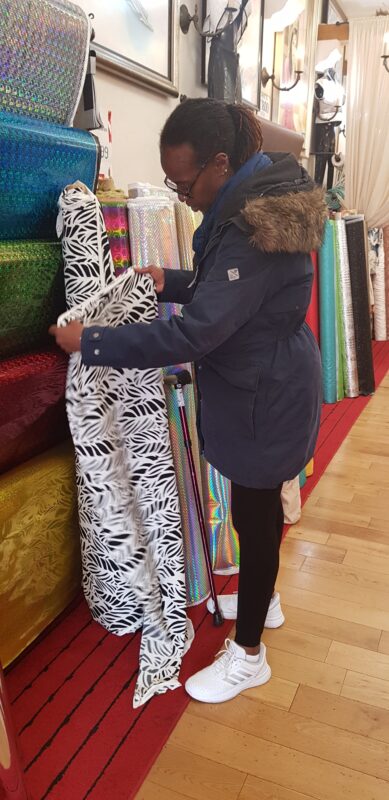
What kind of things do you get up to in your sessions?
Ruby: Going to Rosy’s “sweet shop”, which is the fabric shop! Because Rosy makes loads of clothes and is so good at it! She’ll try and tell you otherwise, but she is! She even made the trousers she’s wearing today…
I only started learning because in Homerton they asked if there was anything I’d like to learn and I thought sewing. But I was really lucky because at the class I had to explain about my disability and the tutor was so good. She was really helpful, and explained things to me. But it brought home some things too…. In my job before as a police officer I could multitask; for instance I could be listening to my radio, writing things down, looking what’s around me. In my sewing class the old me thought I could write, listen and look at the demo at the same time, and then I just realised I couldn’t do that anymore, and it really upset me.
Ruby: The one big thing we started working on together when I first started with Rosy was her course to become a gym instructor for people with disabilities. So the first few months, every session was revision! Even with your short term memory problems Rosy, you were able to memorise so much technical information (every little bone and muscle) and you had 4 different exams. So that was really difficult wasn’t it? But you did it and you passed – first time!
But if it wasn’t for this lady here helping, it would have been a totally different nightmare. Because when I had to do those questions, I would dictate and Ruby would write it all up for me or explain what I want to say, because I find word searching quite hard. If it wasn’t for Headway, I wouldn’t be where I am today, and there’s no way I would have started or completed that course. Headway even helped me to apply for and get funding for the course. We successfully got funding for transport there and back and to get a laptop and Dictaphone – because apart from the brain injury, I’m also partially deaf now. All of this made it possible for me to do the course.
It is very lonely, because having a disability, living on my own and feeling isolated is not a good thing, but I know that at least two days of the week I’m going to get out and see someone, because some days I see no-one. Headway’s been such a big part of my life.
I wouldn’t have anything any different – if someone said to me “oh if you take this pill tonight before midnight and when you wake up in the morning everything will be as it was – you’ll have your health back and you won’t have a disability” I would say no. Because this is me; I’m still learning about me and there’s things that I didn’t do before when I was abled bodied that I’m doing now. Yes it’s ten times harder and life is harder – I thought it was hard then- but it’s more rewarding now.
What do you like most about the sessions?
Ruby: The variety. We’re always doing something interesting. Next week we’re going cycling at the Olympic Park Velodrome with Headway which is great! I find myself doing lots of different things, and it’s so rewarding to help people to achieve their goals. To play some part in that, however minor is great!
And the good thing is that Headway always seem to have nice people! And the way they mirror up people too. I was really funny about that, as an ex police officer I’m thinking “who am I going to have in my house? Will I get on with them?” But all my support workers have been really nice, so I feel really fortunate.
Ruby: Yeah, and the matches are really good. Me and Rosy just get on really well anyway, and we have very similar interests and views on the world so we always have really good and interesting chats. We like cooking, and having lunch together
I really like that – having lunch together on a Thursday. Because I’m on my own for so many hours, it’s nice to know 2 days I’ll definitely see someone and I like that person! Otherwise I’d rather be on my own. Headway is a god send, I don’t know what would have happened – well I do know, I think I’d have been really depressed. It’s just nice having someone who 100% knows and understands you.
Ruby: I think what’s also great is that it’s the same person every week so you really get to know each other, so as a brain injury survivor you don’t have to keep explaining yourself. When you get into the rhythm of it, it works like a breeze.

